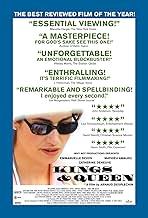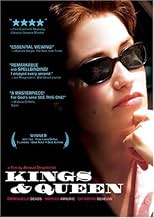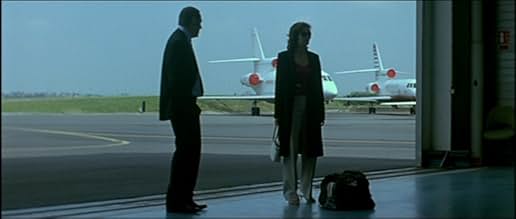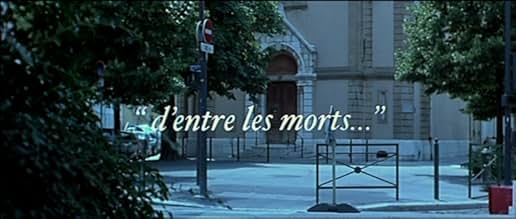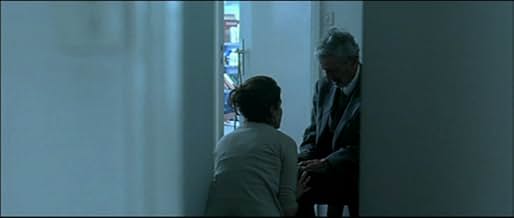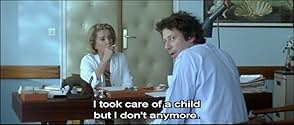Rois et reine
- 2004
- Tous publics
- 2h 30min
NOTE IMDb
7,0/10
4,1 k
MA NOTE
Ajouter une intrigue dans votre langueParallel storylines tell the current state of affairs for two ex-lovers: Nora's a single mother who comes to care for her terminally ill father; holed in up in mental ward, Ismael, a brillia... Tout lireParallel storylines tell the current state of affairs for two ex-lovers: Nora's a single mother who comes to care for her terminally ill father; holed in up in mental ward, Ismael, a brilliant musician, plots his escape.Parallel storylines tell the current state of affairs for two ex-lovers: Nora's a single mother who comes to care for her terminally ill father; holed in up in mental ward, Ismael, a brilliant musician, plots his escape.
- Réalisation
- Scénario
- Casting principal
- Récompenses
- 9 victoires et 18 nominations au total
Avis à la une
(San Francisco Film Festival showing, March 22, 2005) An amazing if somewhat indigestible film, Desplechin's KINGS AND QUEEN (Rois et reine) is a genre-bending family drama that alternates wired comedy with solemn tragedy, in particular nutty violist Ismaël's (Mathieu Amalric's) tax problems and sudden third-party commitment to a mental hospital and ex-girlfriend Nora's (Emmanuelle Devos') discovery that her writer father is dying of advanced stomach cancer. Meanwhile Nora is haunted by memories of the father of her young son Elias (Valentin Lelong), is about to marry a rich "gangster," and other relatives wander in and out of a tumultuous narrative which alternates present tense scenes with flashbacks, dreams and fantasies. Buffoonery and melodrama, which are sometimes hard to separate, turn out to work well together as director Desplechin modestly points out is true of Shakespeare, whose King Lear may have given him the idea for the brutal, vindictive final letter Nora's father, Louis Jenssens (Maurice Garrel) leaves for her. The audience at the SFFF cheered a gratuitous sequence where Ismaël's father Abel (Jean-Paul Roussillon) singlehandedly subdues three punks trying to rob his convenience store while Ismaël looks on with terror. In the next scene, father and son are lifting weights together at a health club. The plan by Abel, who was himself adopted, to adopt a man who's lived with him and his wife for years, over the protests of his adult children, rhymes palpably with the question of Ismaël's adopting Elias, who doesn't like Nora's new man, Jean-Jacques (Olivier Rabourdin). The long scene where Ismaël explains to Elias why he can't adopt him, while they walk through a museum, is one of a number of tours de force.
Secondary characters in this overwritten but always entertaining drama make themselves hard to forget though buffoonery in the case of the Ismaël's junkie lawyer (Hypolytte Girardot); though their neediness, in the case of Arielle, "la Chinoise" a flirtatious 'princess' at the psych hospital, (Magalie Woch) or Nora's sister down-and-out Chloé, (Nathalie Boutefeu); bitchiness in the case of Ismaë's sister. Ismaël's usual shrink is a huge African grande dame; he gets his entrance exam and his walking papers at the hospital from none other than Catherine Deneuve (whose iciness and soulfulness would be an unforgettable blend even if she were not already one of the world's most beautiful sixty-somethings). The women are goddesses, bitches, or queens. Ismaël says women have no souls; but the story's main men are talented but narcissistic problem children. Elias seems poised to grow up into one of those too. Most of the acting is remarkable, or at the very least arresting. The mercurial Amalric and lovely Devos completely live up to their top billing. Still, even their parts might have done with some trimming back.
The movie comes with allusions to Leda and the Swan, Nietsche, Yeats, Emily Dickenson, and a large number of musical references including rap (and a break dancing demo by Ismaël at the mental hospital), Klezmer, Randy Newman and, as a framing device, Moon River. Suspicions that there may be too much going on here are stifled by sheer pleasure in the drama of it all.
Six César nominations in France, where it opened in late 2004.
The title may refer to Shakespeare's plays, or to the way paterfamilias are seen by their children. "Kings and Queen" is wildly unedited and at 2 ½ hours definitely too long; Desplechin even acknowledged repeatedly that his answers to questions after the SFFF showing were too long too. But his inability to edit his work down may be hard to separate from his unique flavor and charm. Desplechin wrote the excellent screenplay for "Un monde sans pitié" ("A World Without Pity," 1989) the story of a fascinating young loser. "Desplechin is a wonder with actresses, at least as long as they're with him: Devos' character is close enough to 'My Sex Life' star and former Desplechin paramour Mariane Denicourt that she responded to the movie with a retaliatory roman à clef," writes Sam Adams in the Philadelphia City Paper. A question about this contretemps met with a flurry of interesting doubletalk from the soft-spoken director.
Secondary characters in this overwritten but always entertaining drama make themselves hard to forget though buffoonery in the case of the Ismaël's junkie lawyer (Hypolytte Girardot); though their neediness, in the case of Arielle, "la Chinoise" a flirtatious 'princess' at the psych hospital, (Magalie Woch) or Nora's sister down-and-out Chloé, (Nathalie Boutefeu); bitchiness in the case of Ismaë's sister. Ismaël's usual shrink is a huge African grande dame; he gets his entrance exam and his walking papers at the hospital from none other than Catherine Deneuve (whose iciness and soulfulness would be an unforgettable blend even if she were not already one of the world's most beautiful sixty-somethings). The women are goddesses, bitches, or queens. Ismaël says women have no souls; but the story's main men are talented but narcissistic problem children. Elias seems poised to grow up into one of those too. Most of the acting is remarkable, or at the very least arresting. The mercurial Amalric and lovely Devos completely live up to their top billing. Still, even their parts might have done with some trimming back.
The movie comes with allusions to Leda and the Swan, Nietsche, Yeats, Emily Dickenson, and a large number of musical references including rap (and a break dancing demo by Ismaël at the mental hospital), Klezmer, Randy Newman and, as a framing device, Moon River. Suspicions that there may be too much going on here are stifled by sheer pleasure in the drama of it all.
Six César nominations in France, where it opened in late 2004.
The title may refer to Shakespeare's plays, or to the way paterfamilias are seen by their children. "Kings and Queen" is wildly unedited and at 2 ½ hours definitely too long; Desplechin even acknowledged repeatedly that his answers to questions after the SFFF showing were too long too. But his inability to edit his work down may be hard to separate from his unique flavor and charm. Desplechin wrote the excellent screenplay for "Un monde sans pitié" ("A World Without Pity," 1989) the story of a fascinating young loser. "Desplechin is a wonder with actresses, at least as long as they're with him: Devos' character is close enough to 'My Sex Life' star and former Desplechin paramour Mariane Denicourt that she responded to the movie with a retaliatory roman à clef," writes Sam Adams in the Philadelphia City Paper. A question about this contretemps met with a flurry of interesting doubletalk from the soft-spoken director.
Armand Deplechin's "Rois et Reine" offers a lot of different ideas, plots and subplots. Unfortunately, most of them aren't as fully realized as in his other, better made films. Then, the copy that is showing at New York's Lincoln Plaza complex, has a washed out look to it, and the subtitles aren't visible at times. The viewer has to strain the eyes in order to get all what's going on in this complex tale. This is a big problem for foreign films with subtitles that seem to fade in the picture itself. Also, at the session we went there was an annoying group of ladies who, evidently, must have been watching another film, as they kept laughing at times when they should have remained silent.
At any rate, this is a complex film that seems to have a lot of influences, mainly mythological and even it has shades of Shakespeare's King Lear. At two hours and forty minutes in length, the film could have used some badly needed trimming. It appears M. Desplechin don't know when to cut some of the things one sees in different sequences that could have been helped with the principle that "less is more".
One thing the director can't be blamed for is the wonderful performances he gets from all his actors, especially, the luminous Emmanuelle Devos, who does an amazing work portraying Nora, the woman at the center of the story. Also good, Mathieu Amalric, who is Ismael, the man that connects a lot of different points to the story. Maurice Garrel, as Nora's dying father is compelling. Valentin Legong as little Elias is also a great asset.
Let's hope M. Desplechin new venture will be a bit tighter in his future work.
At any rate, this is a complex film that seems to have a lot of influences, mainly mythological and even it has shades of Shakespeare's King Lear. At two hours and forty minutes in length, the film could have used some badly needed trimming. It appears M. Desplechin don't know when to cut some of the things one sees in different sequences that could have been helped with the principle that "less is more".
One thing the director can't be blamed for is the wonderful performances he gets from all his actors, especially, the luminous Emmanuelle Devos, who does an amazing work portraying Nora, the woman at the center of the story. Also good, Mathieu Amalric, who is Ismael, the man that connects a lot of different points to the story. Maurice Garrel, as Nora's dying father is compelling. Valentin Legong as little Elias is also a great asset.
Let's hope M. Desplechin new venture will be a bit tighter in his future work.
How do you create a follow up to the two masterpieces that were "Comment je me suis disputé" and "Ester Kahn" (we won't talk about the dull "Léo... en jouant Dans la compagnie des hommes") ? You just listen to what your heart has to say, however hard and difficult it might be, and make no compromises. You don't fear to be misunderstood. You care about the audience but do not let them influence your work. You're a genius but you still have doubts, and these doubts make your art even better. "Rois et Reine" ("Kings and Queen"), Arnaud Desplechin's latest film, lasts 2h40mn and, in spite of its length and its harsh contents, is utterly entertaining, fascinating, moving and even funny. It does not fear to be (often) irritating and boring : the burlesque moments, for instance, are quite annoying, but then again, that's a personal point of view. The thing is, the storyline about Nora's relationship with her father and her ex boyfriend and her son, and then again Ismael's relationship with Nora's son and with his family are so powerful, they don't need more. Unfortunately, Desplechin is often reluctant to cut deep in his movie and as a result, "Rois et Reine" sometimes looks like a long, long ride. Add to that some unfortunate flash backs burdened by bad acting (the character of Pierre) and boy does the movie sound dull at times. Emmanuelle Devos and Mathieu Amalric, finding here the roles of a lifetime, are absolutely fascinating. When in the end, Nora discovers the secret pages of her father's diary, or when Ismael spends an afternoon with Nora's son, it's devastating. I've rarely seen a movie that translates human emotions so beautifully. Just for that, "Rois et reine" is a must see.
The death of a loved one is never pretty, but may be particularly hard in our atomic age; the news of an ailing relative is a bolt from the blue, external to our everyday lives. And unlikely people can make good parents, exactly because being a good parent is not something you achieve by following instructions. These are the sort of thoughts provoked by watching 'Kings and Queen', a French movie about a woman with a dying father, a mad ex-lover and a teenage son. There are definitely some perceptive moments, but overall, the film is a bit uneven; the two halves of the plot (one centred on the woman and her father, the other on her ex) are quite disconnected and also distinct in tone: the former cool and reflective, the latter somewhat riotous; although they come together at the end, this doesn't quite feel like a necessary ending, while other plot lines (such as one centred on the lead character's sister) are not developed. Still, I liked the movie's insight into the selfishness of modern lives and attitudes, which fall short of evil but lie exposed as inadequate under duress: there's a message in this which many could heed.
Rois et Reine starts and ends with an audio feast of divinely beautiful unplugged "Moon River". In between, it offers the richest content that I remember in any film that I've seen.
Use of two parallel, initially apparently unrelated story lines is a favourite structure for movie makers. One that immediately comes to mind is Le Huitieme Jour. In Rois et Reine, one thread is Nora, a beautiful art gallery director struggling with a terminally ill father and a fatherless son Elias. The other thread is Ismael, a viola player taken into a psychiatric ward through strange circumstances. However, it does not take long (relative to the two-and-a-half-hour film) to get to the convergence point where the audience are privy to the fact that Nora and Ismael had lived together for seven years during which Nora's son developed a devoting affection for and attachment to Ismael (which, incidentally, reminds me of a similar relationship in Love Actually, in a character played by Liam Neeson).
But this is only the bare beginning. The sprawling story surrounding these two main characters commands the viewers' every attention, and this film really deserves several viewing.
I wouldn't attempt to go into all the details of the many characters, sub-plots and sub-texts. Briefly, the central story is Nora's relationships with three men, Elias's father who was shot under suspicious circumstances, Ismael who became Elias's de facto father and the man she is now going to marry but is not really certain if she truly loves or not. While those relationships are touched on lightly, some through flashbacks, her relationship with her father Louis and sister Chloe receive sharper focus, with twists and turns leading to some rather devastating revelations towards the end.
With Ismael's family (and there are quite a few members) the circumstances are very different, but equally intriguing. While there is also conflict, and this one centres around the issue of adoption and estate, the mood in one of wry humour. Family matters aside, there is also another dimension, the psychiatric ward, where Ismael interacts with no less than three psychiatrists (one played by Catherine Deneuve) as well as a women fellow-patient Arielle with whom he develops a close relationship that continues after their discharge.
And don't be mislead into thinking that quantity will compromise quality. The entire film is throbbing with energy, telling the story in so many different ways, in so many changing moods, which, however, never feels disjointed. Similarly, the deft use of background music brings you delight in every turn.
I have only touched on the bare surface of this absorbing film. Among the many fascinating aspects of the film is the development of the two main characters and a common characteristic: both are vain and arrogant. Yet, the interesting thing is that they are not portrayed in that light at all. It's through the description by other characters that this comes to light, and then we are compelled to look behind the surface to understand.
The audience will find that there are many scenes, from devastatingly emotional to hilariously noire, that they will remember long afterwards. If I were to pick a most memorable one, however, it will be the last scene, between Ismael and Elias, and I think many who have seen the film will agree. A masterful piece of auteurist work, Rois et Reine is a film that will be a crime to miss.
Use of two parallel, initially apparently unrelated story lines is a favourite structure for movie makers. One that immediately comes to mind is Le Huitieme Jour. In Rois et Reine, one thread is Nora, a beautiful art gallery director struggling with a terminally ill father and a fatherless son Elias. The other thread is Ismael, a viola player taken into a psychiatric ward through strange circumstances. However, it does not take long (relative to the two-and-a-half-hour film) to get to the convergence point where the audience are privy to the fact that Nora and Ismael had lived together for seven years during which Nora's son developed a devoting affection for and attachment to Ismael (which, incidentally, reminds me of a similar relationship in Love Actually, in a character played by Liam Neeson).
But this is only the bare beginning. The sprawling story surrounding these two main characters commands the viewers' every attention, and this film really deserves several viewing.
I wouldn't attempt to go into all the details of the many characters, sub-plots and sub-texts. Briefly, the central story is Nora's relationships with three men, Elias's father who was shot under suspicious circumstances, Ismael who became Elias's de facto father and the man she is now going to marry but is not really certain if she truly loves or not. While those relationships are touched on lightly, some through flashbacks, her relationship with her father Louis and sister Chloe receive sharper focus, with twists and turns leading to some rather devastating revelations towards the end.
With Ismael's family (and there are quite a few members) the circumstances are very different, but equally intriguing. While there is also conflict, and this one centres around the issue of adoption and estate, the mood in one of wry humour. Family matters aside, there is also another dimension, the psychiatric ward, where Ismael interacts with no less than three psychiatrists (one played by Catherine Deneuve) as well as a women fellow-patient Arielle with whom he develops a close relationship that continues after their discharge.
And don't be mislead into thinking that quantity will compromise quality. The entire film is throbbing with energy, telling the story in so many different ways, in so many changing moods, which, however, never feels disjointed. Similarly, the deft use of background music brings you delight in every turn.
I have only touched on the bare surface of this absorbing film. Among the many fascinating aspects of the film is the development of the two main characters and a common characteristic: both are vain and arrogant. Yet, the interesting thing is that they are not portrayed in that light at all. It's through the description by other characters that this comes to light, and then we are compelled to look behind the surface to understand.
The audience will find that there are many scenes, from devastatingly emotional to hilariously noire, that they will remember long afterwards. If I were to pick a most memorable one, however, it will be the last scene, between Ismael and Elias, and I think many who have seen the film will agree. A masterful piece of auteurist work, Rois et Reine is a film that will be a crime to miss.
Le saviez-vous
- AnecdotesThe title of the movie was inspired to Arnaud Desplechin by the five first lines of a poem by Michel Leiris: "Rois sans arrois Reine sans arène Tour trouée Fou à lier Cavalier seul"
- Citations
Nora Cotterelle: There are four men I loved. I killed two of them.
- ConnexionsReferenced in Trust the Man (2005)
- Bandes originalesPavane pour une Infante défunte
Composed by Maurice Ravel
Meilleurs choix
Connectez-vous pour évaluer et suivre la liste de favoris afin de recevoir des recommandations personnalisées
- How long is Kings & Queen?Alimenté par Alexa
Détails
Box-office
- Budget
- 3 871 153 € (estimé)
- Montant brut aux États-Unis et au Canada
- 290 973 $US
- Week-end de sortie aux États-Unis et au Canada
- 16 101 $US
- 15 mai 2005
- Montant brut mondial
- 3 839 556 $US
- Durée
- 2h 30min(150 min)
- Couleur
- Mixage
- Rapport de forme
- 2.35 : 1
Contribuer à cette page
Suggérer une modification ou ajouter du contenu manquant

